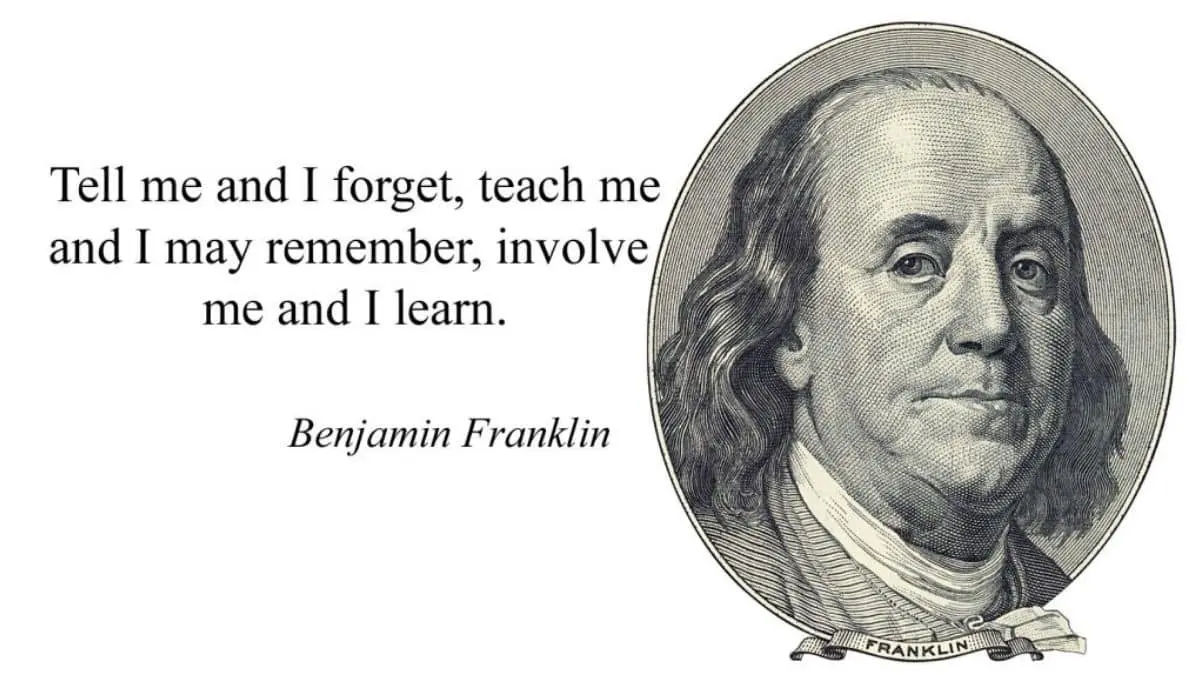In a world brimming with information and continuous learning opportunities, the way we absorb and retain knowledge is more important than ever. The quote, “Tell me and I forget. Teach me and I remember. Involve me, and I learn,” often attributed to Benjamin Franklin, succinctly encapsulates the philosophy of experiential learning. This blog post explores the profound implications of this quote in various facets of life.
Understanding the Quote
- Tell me and I forget: This part of the quote reflects the limitations of passive learning. Here, we’ll explore how traditional lecture-based learning methods can be less effective in long-term knowledge retention.
- Teach me and I remember: This line signifies the improvement in learning retention through active teaching methods. It’s an opportunity to discuss the role of teachers, mentors, and the environment in enhancing memory retention.
- Involve me, and I learn: The crux of the quote emphasizes the highest form of learning – involvement or experiential learning. This section would explore how hands-on experiences, practical applications, and real-world problem-solving lead to deeper understanding and long-lasting learning.
Experiential Learning in Depth
- Definition: Experiential learning is the process of learning through experience and is more specifically defined as “learning through reflection on doing.”
- Theoretical Background: This concept is often associated with the work of David Kolb and his experiential learning theory, which is based on the work of John Dewey, Kurt Lewin, and Jean Piaget. Kolb’s model highlights four stages of learning: concrete experience, reflective observation, abstract conceptualization, and active experimentation.
Core Principles of Experiential Learning
- Reflection, Critical Analysis, and Synthesis: Experiential learning involves not just the experience itself but also reflection on the experience. This reflection helps in analyzing and synthesizing the information to form abstract concepts.
- Personalized Learning: It recognizes that each individual’s experiences and learning styles are different, allowing for a more personalized learning experience.
- Learning from Real Situations: This method often places learners in real-life or simulated situations where they must apply their skills and knowledge.
Benefits of Experiential Learning
- Improved Retention: Hands-on experiences are more likely to be remembered.
- Development of Critical Thinking and Problem-Solving Skills: Learners are often placed in situations where they need to think critically and solve problems.
- Enhanced Transfer of Skills and Knowledge: Learners can more readily apply what they have learned in real-world situations.
- Increased Engagement and Motivation: Learners are often more engaged and motivated when they are actively involved in their learning process.
Incorporating Experiential Learning in Various Settings
- In Education: Teachers can incorporate project-based learning, labs, and workshops.
- In Business Training: Companies can use simulations, team-building exercises, and hands-on training.
- In Personal Development: Individuals can engage in self-directed projects, hobbies, or travel to learn new skills or languages.

Application in Personal Development
Experiential learning extends beyond formal educational settings and plays a crucial role in personal development. It involves adopting a proactive approach to learning and growing through various life experiences. This section will explore how the principles of experiential learning can be applied to personal growth and lifelong learning.
Embracing Experiential Learning for Personal Growth
- Mindset for Learning: Cultivate a mindset that views every experience as a learning opportunity, whether it’s a success or a challenge.
- Self-Reflection: Regularly reflect on personal experiences, evaluate what was learned, and consider how it can be applied in the future.
- Seeking New Experiences: Actively seek out new experiences that challenge comfort zones, such as traveling, learning a new hobby, or volunteering.
Experiential Learning in Daily Life
- Learning from Relationships: Interpersonal relationships are a rich source of experiential learning. Engaging actively with others can teach empathy, communication skills, and emotional intelligence.
- Problem-Solving in Real-Life Situations: Everyday challenges, whether planning a trip or managing finances, can be approached as opportunities for learning problem-solving and critical thinking skills.
Conclusion
The essence of the quote “Tell me and I forget. Teach me and I remember. Involve me, and I learn.” reflects a timeless truth about human learning and development. It emphasizes that the most enduring form of learning comes not from passive absorption of information but through active engagement and practical experience. This is as true in today’s digital and fast-paced world as it was in the time of Benjamin Franklin.
Also Read: Success is the sum of small efforts, repeated









